Israel-Hamas war: Hezbollah leader Hassan Nasrallah makes key speech

Doocy asked, “If Qatar is so helpful, why aren’t we asking them to hand over the leader of this terrorist group
??!!
A highly anticipated speech by Hezbollah has started but the anti-Israeli group’s leader has used it to make a surprising admission.
Welcome back to our live coverage of the war between Israel and Hamas.
Hezbollah leader Hassan Nasrallah is making a closely watched speech to lay out the heavily armed anti-Israeli group’s next steps in the war.
It his the influential chief’s first speech since the comflicty began. There are concerns the Lebanon based militia could open a northern front in the conflict.
But he has distanced Hezbollah from the October 7 attacks saying they were “100 per cent Palestinian” organised.
The Israel Defence Forces (IDF) said late on Thursday it had “completed the encirclement” of Gaza City, “the centre of the Hamas terror organisation”, following days of expanding ground operations in the besieged territory.
Hamas’ military wing, the Ezzedine Al-Qassam Brigades, said in response that Gaza would be a “curse” for Israel and that its invading soldiers would go home “in black bags”.
Thursday marked the 27th day of the conflict sparked by the October 7 attacks when Hamas terrorists stormed the border, killing 1400 people and kidnapping more than 240, Israeli officials say.
The Hamas-run health ministry in Gaza claims more than 9000 people have been killed in Israel’s subsequent attacks, including 3760 children. Those figures have not been independently verified.
US Secretary of State Antony Blinken is meeting Israeli Prime Minister Benjamin Netanyahu today to discuss measures to protect civilians, as global aid organisations continue calls for an immediate ceasefire.
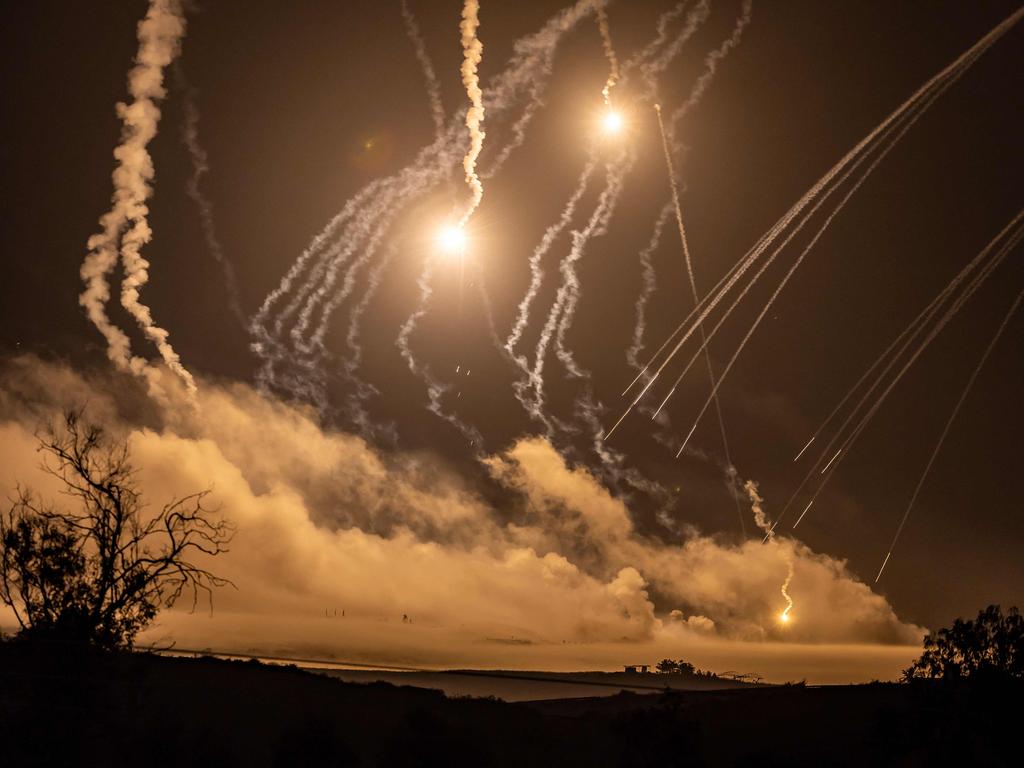
Apocalyptic live images of Gaza on Thursday night showed Israel intensifying its aerial bombardment of the territory.
Hezbollah chief’s surprising reveal
A highly anticipated speech by Hezbollah chief Hassan Nasrallah has begun. There are concerns he could use the diatribe to declare war on Israel opening up a northern front.
But in his opening remarks Nasrallah has said Hezbollah, and its benefactor Iran, had nothing to do with the October 7 attacks which started the Israel-Gaza war.
“This was 100 per cent Palestinian,” he said on Friday, Lebanon time.
“The international community keeps bringing up Iran and its military plans, but the October 7 attack was a 100 per cent Palestinian operation, planned and executed by Palestinians for the Palestinian cause, it has no relation at all to any international or regional issues.”
“This element of secrecy was the linchpin to the shocking success.”
Nonetheless, Nasrallah basked in the attack’s results and said the outcomes of the attack were profound and showed how ”weak” Israel was.
“The glorious operation,” exposed “the frailty, weakness and total fragility of Israel … it’s more fragile than a spider’s web”.
‘Some would like us to join a war’: Hezbollah chief
Hezbollah leader Hassan Nasrallah has threatened more attacks on Israel, but appears to be lowering expectations that he will declare war. At least for now.
“Some claim Hezbollah is about to join the fray. I tell you: We have been engaged in this battle since October 8
“Some would like Hezbollah to engage in an all-out war, but I can tell you: What is happening now along the Israeli-Lebanese border is significant, and it is not the end.
He said Hezbollah’s action since then had been “significant”.
“We have been targeted Israeli soldiers, tanks, drones and sensors, the eyes and ears of Israel. We have been engaged in a true battle. The amount of our martyrs — 57 — testifies to this,” he says.
But he warned, Hezbollah’s stance could change depending on Israel’s actions in Gaza.
“All scenarios are open on our Lebanese southern front”.
Nasrallah added the IDF had been forced to divert forces, weapons and equipment from Gaza and the West Bank to the border with Lebanon.
“One-third of the IDF is now amassed on our border,” he claims, although Hezbollah does not rule Lebanon.
He also warned Israel against a “pre-emptive attack” against Hezbollah.
“It will be the most foolish mistake you make in your entire existence”.
Howvere, both the IDF and Hezbollah have been attacking one another in the border region.
Hezbollah blames US for Gaza war
Nasrallah has said the US, not Israel or Hamas, is “responsible” for the current conflict.
“The United States is completely responsible for the war raging in Gaza … It is the US that must pay the price for the crimes perpetrated in Gaza.”
That will raise fears of possible attacks on US bases within the Middle East, of which there are many, or terrorist attacks.
‘Drunk’: Hezbollah leader’s bizarre claim
During his speech Hezbollah leader Hassan Nasrallah made the preposterous claim that most of the 1400 victims on October 7 were killed by “drunk” Israeli soldiers.
That’s despite Hamas militants in some cases gloating over their kills and footage of gunmen shooting Israelis.
IDF soldiers were “acting insanely as they were caught by surprise and were drunk,” he said, reported The Times of Israel.
Nasrallah also said that Israel “cannot achieve” its goal of eliminating Hamas.
“Among the gravest mistakes committed by the enemy in the past is setting high goals that they cannot achieve. They set as the top goal to annihilate Hamas, the whole of Hamas”.
A number of commentators have shared that observation – that even if Israel destroys Hamas’ command centres, tunnels and top commanders, it will still continue to exist in some capacity.
Israel on ‘very, very’ high alert state ahead of speech.
Israel has said it is on a “very, very high” alert level at its northern border with Lebanon due as concerns ramp up that a new front could open in the war.
The Head of militant group Hezbollah Hassan Nasrallah gave a speech today (Friday local time).
Hezbollah is based in Lebanon but its forces are separate to the Lebanese armed forces.
There have already been skirmishes between Israeli troops and Hezbollah forces at the border since the Israel-Gaza war began.
If Hezbollah increase attacks, or declares war, it will mean Israel will have to fight Hamas to the south and Hezbollah to the north.
But Tel Aviv has said its up for the fight.
“We are at a very high level of readiness in the north – on a very, very high level of alertness to respond to any event that occurred today and in the days to come,” Israeli Defence Forces spokesman Daniel Hagari said.
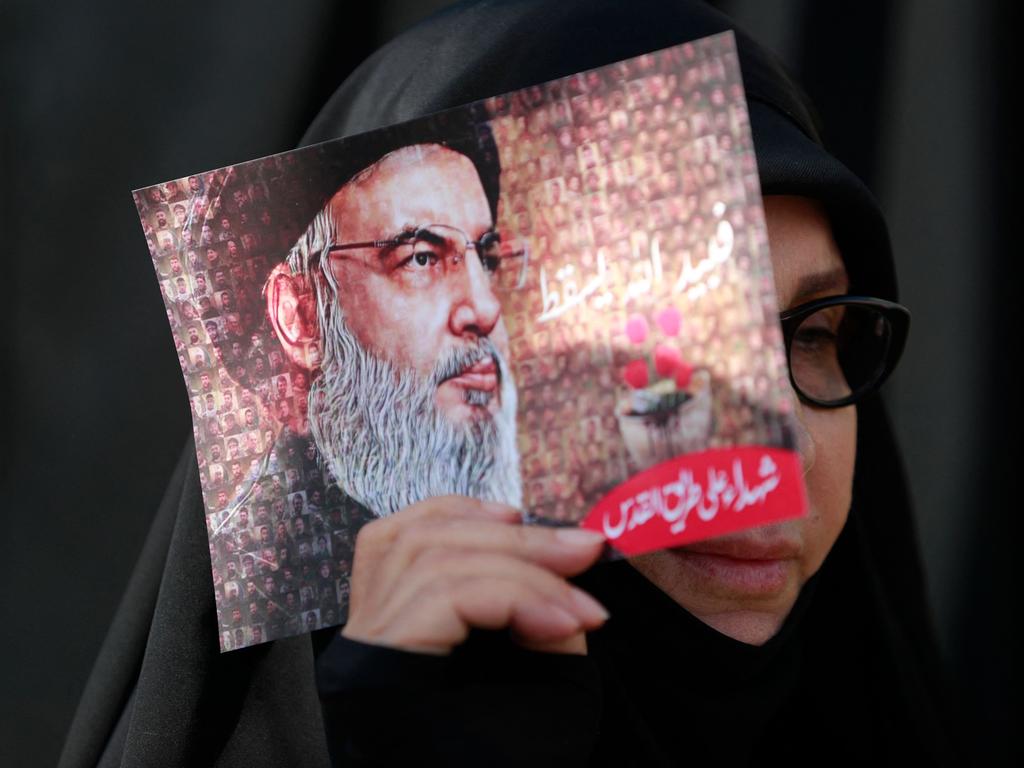
A woman holds up an images of Lebanon’s Hezbollah chief Hassan Nasrallah during a rally at a stadium in Beirut.
Blinken in Israel seeking ‘concrete steps’ to reduce Gaza civilian harm
US Secretary of State Antony Blinken arrived in Israel on Friday in a trip focused on measures to minimise harm to civilians in the war in Gaza.
The office of Israel’s Prime Minister Benjamin Netanyahu posted pictures of the meeting between the Israeli PM and Blinken.
It posted on X: “Prime Minister Benjamin Netanyahu is now holding a private meeting with US Secretary of State Antony Blinken, at the Kirya in Tel Aviv.
“They will also meet with the members of the War Cabinet.
Blinken is on his third visit to the country since the deadly Hamas attacks on 7 October.
Prior to his departure from the US, Blinken said he would seek “concrete steps” from Israel to ensure that harm to Palestinian civilians is reduced, as US President Joe Biden also called for humanitarian pauses in the conflict.
This is Blinken’s second trip to the Middle East since fighting erupted on October 7.
“We will be talking about concrete steps that can and should be taken to minimise harm to men, women and children in Gaza,” Blinken told reporters before departing for Israel.
“This is something that the United States is committed to.”
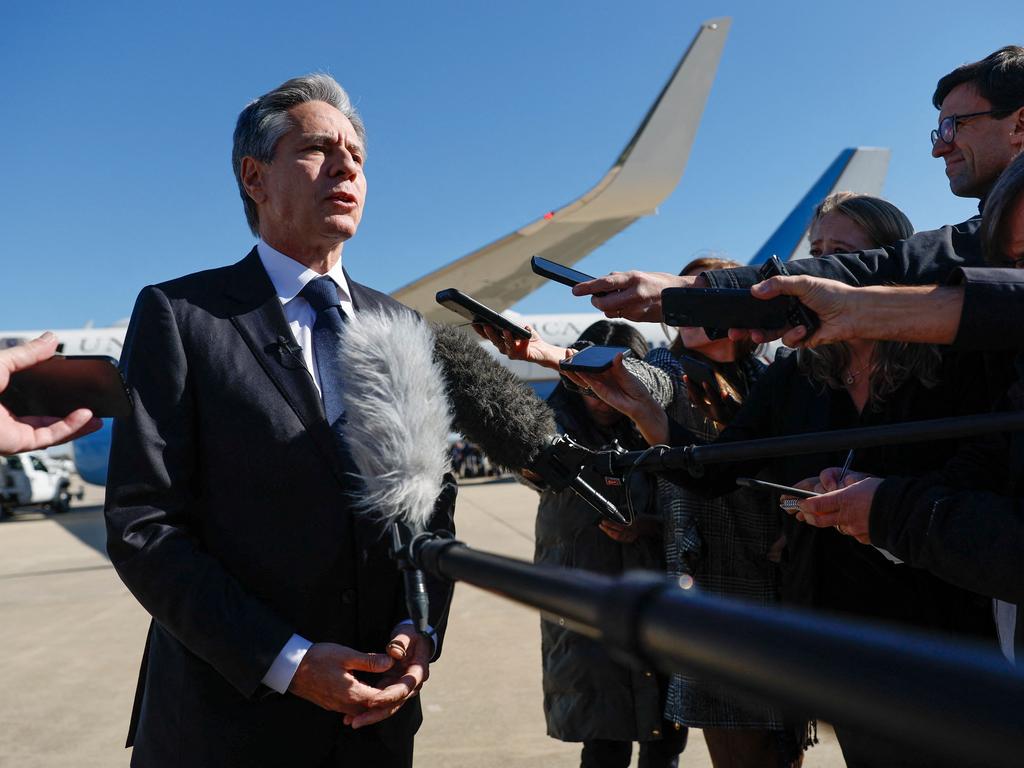
US Secretary of State Antony Blinken
“When I see a Palestinian child — a boy, a girl — pulled from the rubble of a collapsed building, that hits me in the gut as much as seeing a child in Israel or anywhere else,” Blinken said.
“So this is something that we have an obligation to respond to, and we will.”
Biden promises ramped up military aid
Biden has promised full support and ramped-up military aid to Israel for its campaign in Gaza, but in a visible shift of tone has also voiced empathy for Palestinian suffering which has stoked anger in parts of the world.
“I think we need a pause,” Biden said on Thursday at a campaign event.
US National Security Council spokesman John Kirby later clarified what such a pause would entail.
“A humanitarian pause … is temporary, localised and focused, focused on a particular objective or objectives, humanitarian aid in, people out,” Kirby told reporters
UN reveals huge figure required to assist Gaza civilians
The UN on Friday launched an emergency aid appeal seeking $1.2 billion to help some 2.7 million people in Gaza and the West Bank.
“The cost of meeting the needs of 2.7 million people – that is the entire population of Gaza and 500,000 people in the occupied West Bank – is estimated to be $1.2 billion,” the Office for the Coordination of Humanitarian Affairs (OCHA) said.
“The original appeal, launched 12 October, asked for $294 million to support nearly 1.3 million people. The situation has grown increasingly desperate since then,” it added.
It came after Israel began sending thousands of Palestinian workers back to Gaza who had been stranded inside Israel since its war with Hamas erupted, a Gaza border official said.
“Thousands of workers who were blocked in Israel since October 7 have been brought back,” Hisham Adwan, head of Gaza’s crossings authority, told AFP.
AFPTV footage shot early on Friday showed groups of workers arriving through the Karem Abu Salem crossing between Israel and southern Gaza, which is normally only used for goods.
Israel ‘severs all contact’ with 18,500 workers
The Israeli government has announced that thousands of Gazans working in Israel will be sent back to the region under siege, as part of Prime Minister Benjamin Netanyahu’s bold retaliation plan following the October 7 attacks.
“Israel is severing all contact with Gaza. There will be no more Palestinian workers from Gaza. Those workers from Gaza who were in Israel on the day of the outbreak of the war will be returned to Gaza,” a post from Mr Netanyahu’s office on X, formerly Twitter, said.
Israel’s security cabinet has also made moves to “deduct all funds designated for the Gaza Strip … from Palestinian Authority [PA] funds”.
Prior to the current conflict, approximately 18,500 Palestinians from Gaza had been given permits to enter Israel.
White House grilled on Qatar role
A senior White House official has bristled during a tense grilling over what is possibly the biggest elephant in the room of the conflict — the role of Qatar in continuing to give shelter to Hamas.
Speaking about getting Americans out of Gaza, US President Joe Biden recently said he wanted to “thank our partners in the region and particularly Qatar”.
“The leader of Hamas lives in Qatar, so why is President Biden thanking them for anything?” Fox News reporter Peter Doocy asked White House National Security Council spokesman John Kirby at Thursday’s briefing.
“Oh geez, Peter — take a step back here and look at this,” Mr Kirby said. He insisted Qatar had “been helpful” in getting American hostages, Judith Raanan and her 17-year-old daughter Natalie, released last month.
“I’m sure you would agree with me and everybody at your network would agree that getting the hostages out is a good thing, and Qatar was key player in that regard,” he said.
“Qatar has lines of communication [with Hamas] that not everybody else has and it would be irresponsible … if we weren’t doing everything we could and having every possible conversation we can have to get Americans that are held hostage back home with their families.”
Doocy asked, “If Qatar is so helpful, why aren’t we asking them to hand over the leader of this terrorist group?”
“We are working with Qatar to get our people out and to help get aid in,” Mr Kirby said. “That’s a priority right now and, obviously, we’re also helping Israel go after Hamas.”
Writing in The Wall Street Journal this week, former National Security Council official Richard Goldberg said the US must issue an ultimatum for Qatar to “stop sheltering Hamas”.
“More than three weeks after the October 7 atrocities, Qatar still plays host to Hamas’ ‘political’ leaders, allowing the terror group to co-ordinate with Iran and pump its propaganda throughout the world,” Mr Goldberg said.
“Doha says its relationship with Hamas benefits the US and Israel, providing a channel to negotiate the release of hostages held in Gaza. Rather than indulge this charade, the White House and Congress should issue an ultimatum to Qatar — shut down all support for Hamas and deliver the hostages, or suffer the consequences.”
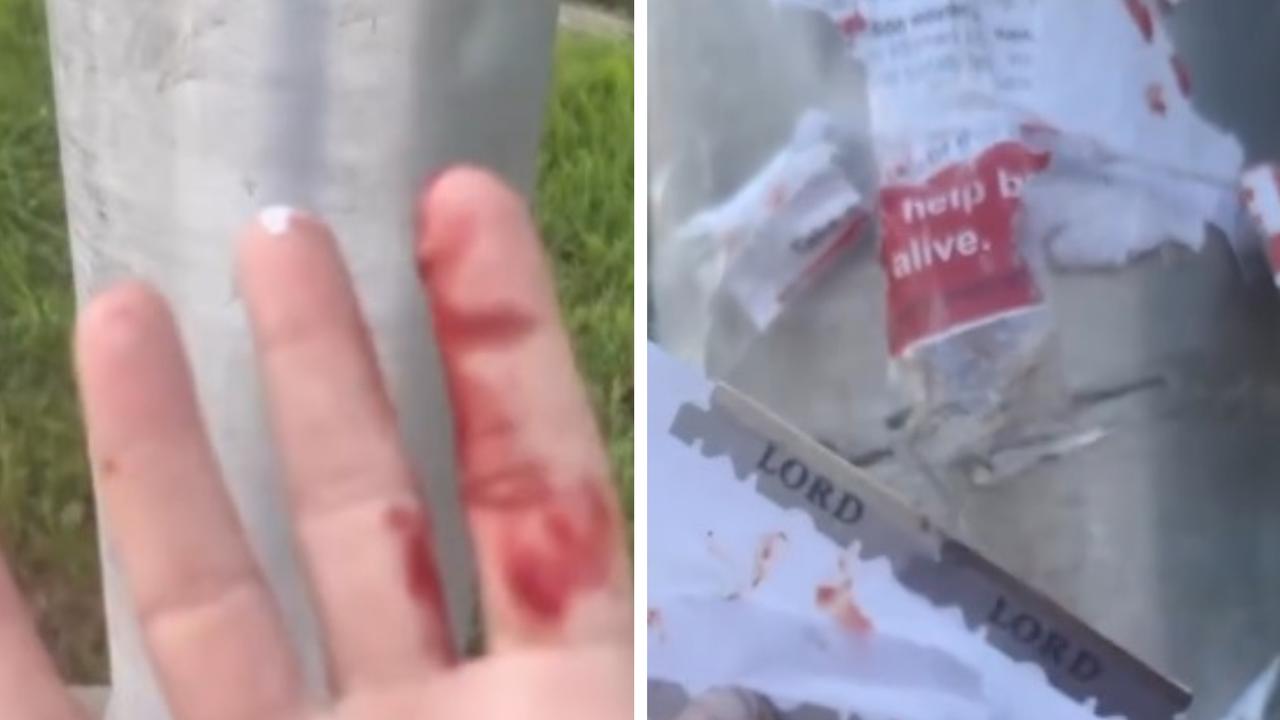
The video claims razor blades were placed on the posters.
Claims razor blades placed on posters
Unverified video circulating on social media purports to show a woman whose fingers were cut by razor blades after attempting to tear down posters of kidnapped Israelis.
The posters featuring images of some of the more than 200 Israelis being held by Hamas have been put up in cities around the world, but have emerged as a major flashpoint as Palestinian supporters tear them down, often sparking heated confrontations.
“Guys, these people are putting razors in these papers because people are snatching them out, and this is what’s going on right now,” an unidentified woman says in the video.
She shows her fingers with what appears to be blood on them and holds up torn scraps of posters with razor blades stuck to the back.
“Tell me who the f**k the real terrorist is,” she says.
“Who does this? Who puts razors on f**king papers? People are snatching them out because we know where the terrorism is coming from. Six thousand dead kids, OK? Now let’s sue the s**t out of them.”
The original source of the video wasn’t immediately clear.
It was shared by the Instagram account @miamiproblemss and reported by influencer Ian Miles Cheong to X, where it has been viewed more than 8 million times.
“That’s one way of dealing with people who rip down posters,” he wrote.
One person commented, “I agree that no one should take down the posters, but there should not be any razors on these posters either.”
“Public booby traps are highly illegal,” another said.
But some questioned whether the footage was real.
“Looks fake to me,” one said.
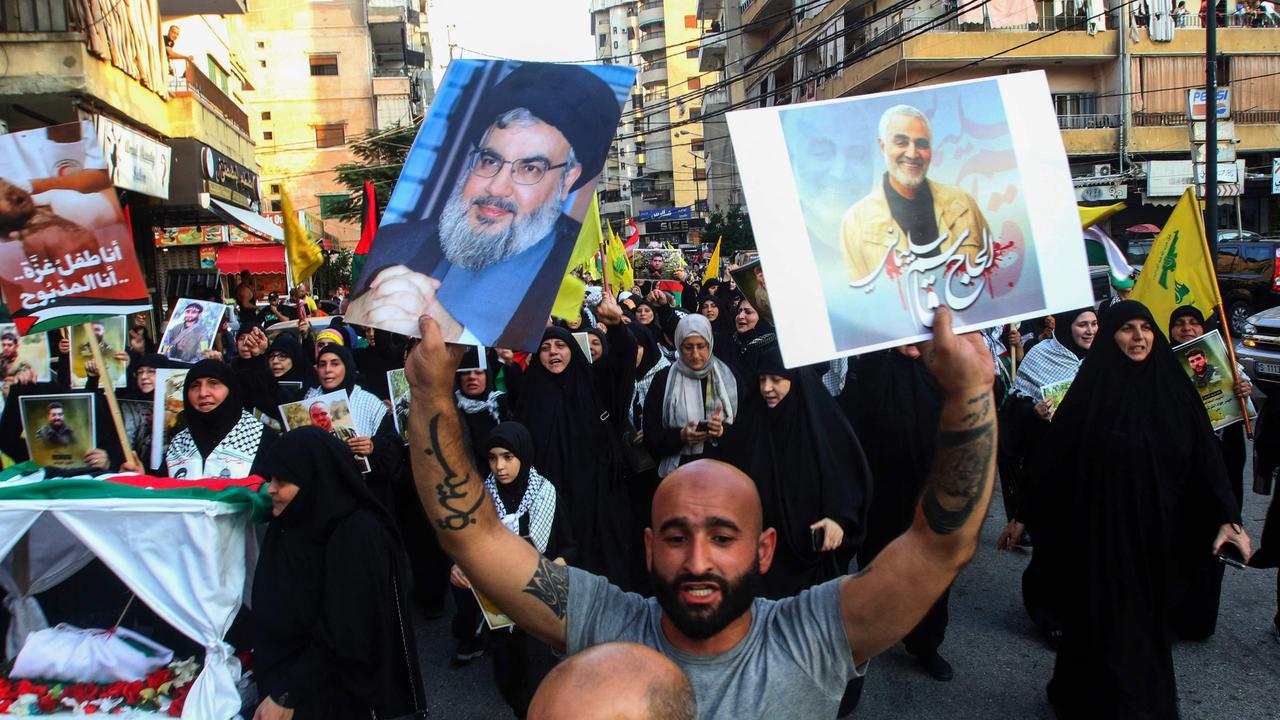
A placard depicting Hezbollah chief Hassan Nasrallah, left.
Hezbollah leader to give major speech
Hezbollah leader Hassan Nasrallah is set to give his first public speech on Friday since the war began, sparking fears the conflict is about widen.
Footage posted to social media showed a massive, elaborate stage being prepared in Beirut for Nasrallah’s speech, with hundreds of chairs for audience members.
The speech is reportedly scheduled for 3pm local time on Friday (midnight AEDT).
Hezbollah has released a series of short, cryptic videos featuring Nasrallah in recent days, hinting the Hamas ally is preparing to join the fight against Israel.
“This is Nasrallah’s moment,” Mohannad Hage Ali, an expert on Lebanon with the Carnegie Middle East Center, told Al Jazeera.
“Millions of Arabs will be watching his speech across the world. They will listen to the only leader in the region that is capable of speaking to their anger and despair by telling them that he will act and support Palestinians in Gaza, who face an existential threat of expulsion.”
Mr Hage Ali said Hezbollah “views this conflict as an existential one”.
“They think that if Israel manages to meet its objectives in eradicating Hamas in the Gaza Strip, then they will turn around and deal with what they see as the Hezbollah threat,” he said.
It comes as the Israeli military said it had targeted Lebanon’s Hezbollah with a “broad assault” on Thursday in which “warplanes and helicopters” attacked Hezbollah targets “in response to fire from Lebanese territory earlier today, together with attacks with artillery and tank fire”.
The Iran-backed militant group said four of its fighters died in the strikes, after announcing it had attacked 19 Israeli positions simultaneously.
The Israel-Lebanon border has seen escalating tit-for-tat exchanges, mainly between the Israeli army and Hezbollah.
US Secretary of State Antony Blinken said on Thursday as he departed for another Middle East diplomatic tour that the United States was “determined to deter any escalation”.
White House National Security Council spokesman John Kirby told reporters that the US hadn’t “seen any indication” that Hezbollah was ready to fully join the war against Israel and was still “concerned about continued attacks on Israeli forces in the north” by the group.
Mr Kirby added the US would be following the highly anticipated speech.
Intense images of night-time bombardment
Apocalyptic live images of Gaza on Thursday night showed Israel intensifying its aerial bombardment of the territory.
Flares and explosions illuminated the skies of northern Gaza, footage aired by CNN showed.
Watching from Sderot, Israel, CNN international diplomatic editor Nic Robertson said he saw flares raining down for more than half an hour in some of the most intense volume since October 7.
Robertson said the focus of the attack appeared to be in the area of Beit Hanoun, near Gaza City, which has traditionally experienced the first military moves by the IDF in past operations, according to the network.
He said it appeared two rockets were fired out of Gaza during this time and artillery fire was also heard nearby. There also appeared to be a smoke screen covering the ground, suggesting possible troop movement.
Senior Israeli government adviser Mark Regev told the broadcaster he could not provide details as the operation was ongoing, but said the military was keeping up pressure on Hamas.
“We are hitting its military machine,” he said. “Our goal is to destroy Hamas’ military machine and to dismantle its political control over Gaza.”
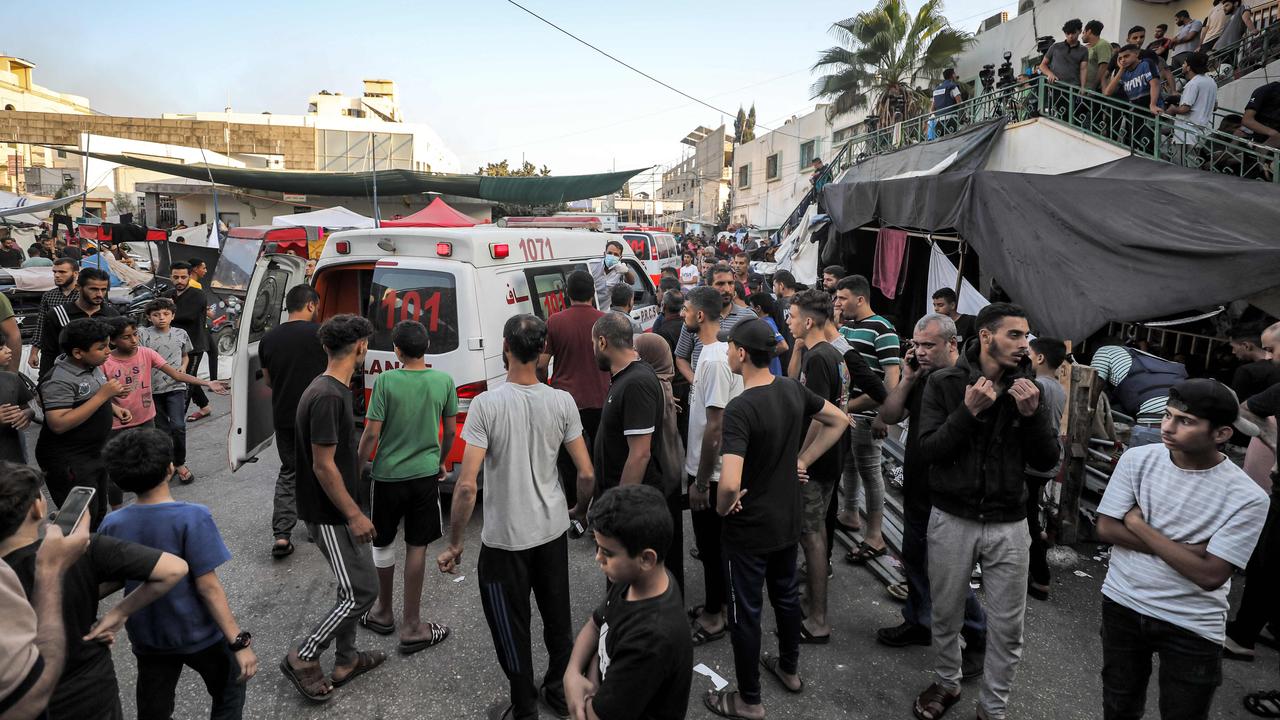
An ambulance arrives at Al-Shifa hospital in Gaza City
Israel weighing brief ceasefire
Israeli Prime Minister Benjamin Netanyahu is considering US requests for a short humanitarian ceasefire of several hours, Hebrew-language outlet Kan News reports.
It comes as US Secretary of State Antony Blinken is due in Israel on Friday to discuss a possible ceasefire and other measures to protect civilians.
The US on Thursday called for humanitarian pauses in the conflict that would involve “temporary, localised” cessation of hostilities — well short of a general ceasefire.
At a campaign event on Wednesday, US President Joe Biden was urged by a member of the audience to call for a ceasefire in the war.
“I think we need a pause,” Mr Biden replied.
Talking to reporters on Thursday, National Security Council spokesman John Kirby clarified what such a pause would entail.
“A humanitarian pause … is temporary, localised and focused, focused on a particular objective or objectives, humanitarian aid in, people out,” Mr Kirby said.
Mr Blinken said he would be seeking “concrete measures” from Israel to protect Gaza civilians as he headed on his second crisis trip to the Middle East since the war broke out.
But the US opposes calls from across the Arab world and some European allies for a ceasefire, saying Hamas has no intention of stopping attacks and would only use a truce to regroup.
“When I see a Palestinian child — a boy, a girl — pulled from the rubble of a collapsed building, that hits me in the gut as much as seeing a child in Israel or anywhere else,” Mr Blinken said.
“So this is something that we have an obligation to respond to, and we will.”
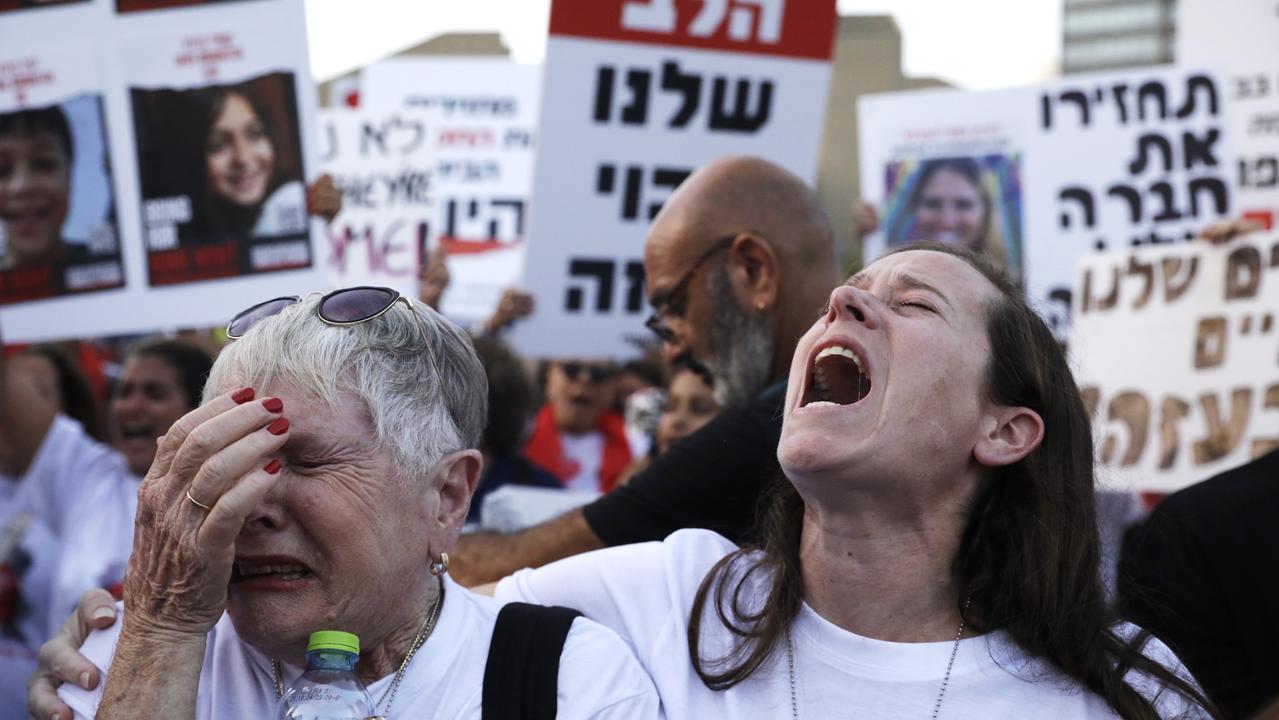
Family and friends of hostages in Tel Aviv.
Hamas sending texts to hostage families
Families of civilian hostages held in Gaza have been receiving text messages in Hebrew purporting to be from Hamas, Israeli media are reporting.
The messages reportedly ask the recipients to click a link to receive information on the hostages, Hebrew-language outlet Kan News reports, via The Times of Israel.
“This is a message from Al-Qassam,” reads the message, referring to Hamas’ military wing.
“We have offered your government a prisoner swap, but it was not accepted. This is our message: the release of all Zionist prisoners in exchange for the release of all Palestinian prisoners.”
The Israeli army is seeking to free around 240 hostages, both civilians and troops, captured by Hamas during the October 7 attacks.
The Palestinian terror group’s brutal incursion into southern Israel claimed 1400 lives and was the worst attack in the country’s 75-year history.
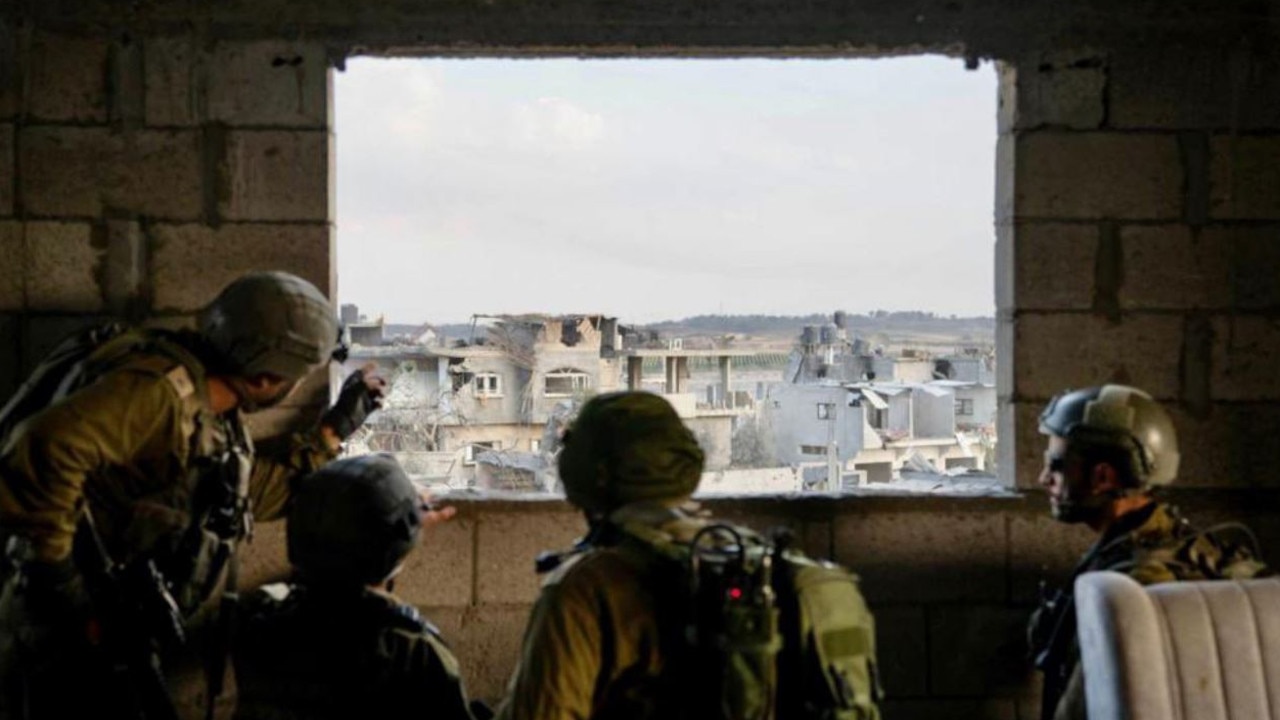
IDF troops operating inside Gaza.
IDF has ‘completed encirclement’ of Gaza City
Israel’s military said on Thursday its forces have surrounded the Hamas stronghold of Gaza City after a day that saw the Palestinian territory pounded by deadly fire.
The Ezzedine Al-Qassam Brigades, the military wing of Hamas, warned Israel its invading soldiers would go home “in black bags”.
“Gaza will be the curse of history for Israel,” spokesman Abu Obeida said.
The Hamas warning came after Israeli military spokesman Daniel Hagari said troops had completely surrounded Gaza City after days of expanding ground operations.
“Israeli soldiers have completed the encirclement of the city of Gaza, the centre of the Hamas terror organisation,” Mr Hagari told journalists.
“The concept of a ceasefire is not currently on the table at all.”
In northern Gaza, ground fighting flared again overnight as Israeli troops battled Hamas.
Israeli army chief of staff Lieutenant General Herzi Halevi said troops were inside Gaza, besieging Gaza City and “deepening infiltration” of Hamas-held areas.

“Israeli soldiers are fighting face-to-face with a brutal enemy,” he told reporters.
The Israeli army is also seeking to free around 240 hostages, both civilians and troops, captured by Hamas during the attacks.
Some 332 soldiers have already died in the October 7 attacks and in the Israeli offensive the Hamas assault triggered.
Now gruelling urban warfare lies ahead deeper inside Gaza, where Hamas is fighting from a tunnel network spanning hundreds of kilometres.
Amid growing fears of the conflict spreading, Israel and Hezbollah fighters in Lebanon exchanged fire after a salvo of rockets slammed into a northern Israel town.
As he left on a new Middle East visit, US Secretary of State Antony Blinken said he would work to avoid escalation of the Israel-Hamas war.
“We’ve been very clear in some of the actions we’re taking that we are determined to deter any escalation,” Mr Blinken said.
President Joe Biden says the US supports a humanitarian “pause” in the conflict to relieve pressure on civilians but opposes calls for a ceasefire, saying Hamas has no intention of holding fire and Israel has a right to defend itself.
Hezbollah said it attacked 19 Israeli positions along the border simultaneously on Thursday, ahead of a speech by its leader Hassan Nasrallah on the Israel-Hamas war.
The Israeli military said “warplanes and helicopters attacked in recent hours targets of the Hezbollah terror organisation in response to fire from Lebanese territory earlier today, together with attacks with artillery and tank fire”.
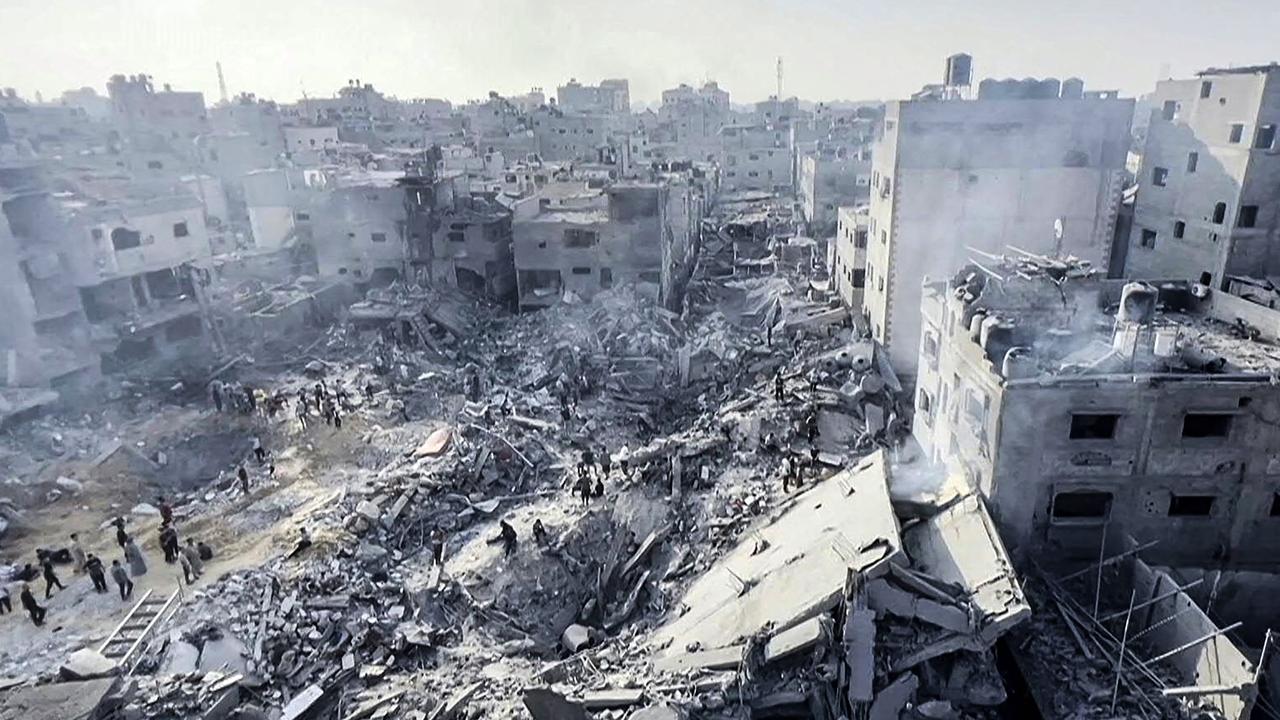
Palestinians survey the destruction after an Israeli strike on the Jabalia refugee camp.
Australian grapples with impossible choice
Among the foreign nationals currently stuck in Gaza is 77-year-old Abdallah Dahalaan, an Australian citizen. He and his wife, not a citizen but an Australian visa holder, made it to the Rafah crossing — the only way across the Strip’s border with Egypt.
Mr Dahalaan was told he could pass through the crossing. His wife could not.
The Sydney Morning Herald reports that he faced an agonising, near impossible choice — whether to return home to his children, or remain in Gaza with his wife.
“I want my kids to understand that I couldn’t leave my wife behind,” Mr Dahalaan said.
“Their father had to do the right thing.”
He does not intend to make the “dangerous” trip to the Rafah crossing again unless he knows for certain that his wife will be allowed passage as well.
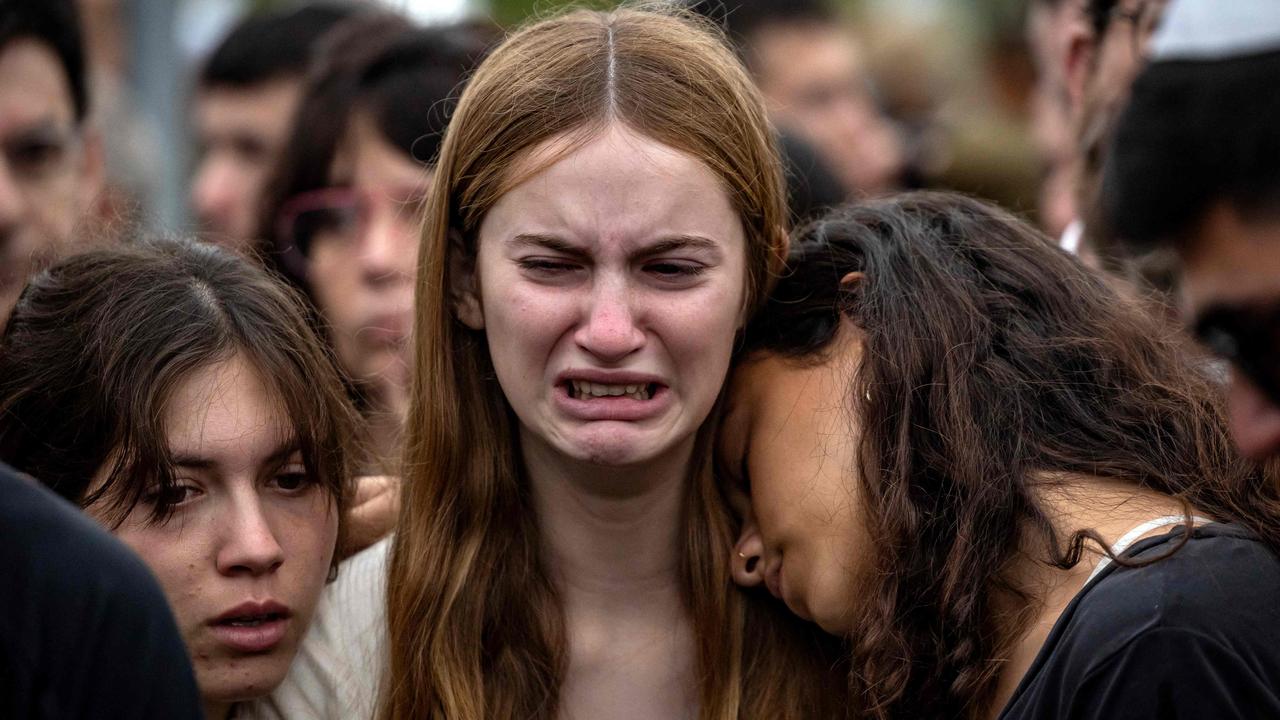
Relatives grieve during the funeral for an Israeli soldier. Picture
Hamas stockpiles fuel as civilians suffer
For days we’ve been reporting on the severe fuel shortage in Gaza, which has left residents without power and caused hospitals to shut down.
Meanwhile, as NBC now reports, Hamas has been keeping a stockpile of more than 200,000 gallons (about 750,000 litres) of fuel for itself, to power the rockets it is firing into Israel and the generators that keep its network of underground tunnels functioning.
That figure is only an estimate — but the amount of fuel being stockpiled is certainly immense.
“Hamas has its own supply stockpile of fuel,” US Secretary of State Antony Blinken told his country’s Senate on Tuesday.
“If it cared a whit about the people of Gaza, it would make sure itself that it used that fuel to have the hospitals be able to operate the incubators, stay turned on. But of course, it doesn’t.”
An Israeli academic with expertise in energy, Elai Rettig, told NBC “we don’t know much they have”.
“We definitely don’t know how much they need, because no one is sure to what extent this underground city goes,” Professor Rettig said.
“If it’s just for ventilation and basic communication, it will last for months.”
Israel reportedly strikes another refugee camp
The Associated Press and Al Jazeera report that Israel has struck the Bureij refugee camp, which is located in the middle of the Gaza Strip.
Bureij, home to about 46,000 registered refugees, is smaller than the Jabalia camp, which has been hit by multiple air strikes targeting Hamas figures and infrastructure this week.
The death toll from the Bureij strike is reportedly 15, though that may grow, with dozens more people trapped under the rubble of damaged buildings.
“My family and I were sitting, and all of a sudden we heard a huge explosive. Everything was flying around us. We couldn’t see anything but dust and smoke,” a survivor told Al Jazeera.
“It was massive. The whole area is turned upside down.
“That was my home. Now it is totally in ruins. I do not know what to say. We are helpless.”
Medical teams are reportedly struggling to access the site, leaving residents to try to move the rubble themselves.
“My two sisters, along with all their children,” another survivor, who was trying to shift rubble, said.
“We are helpless. We cannot remove this heavy concrete. It is too late, even if we find them. They must be dead by now.”
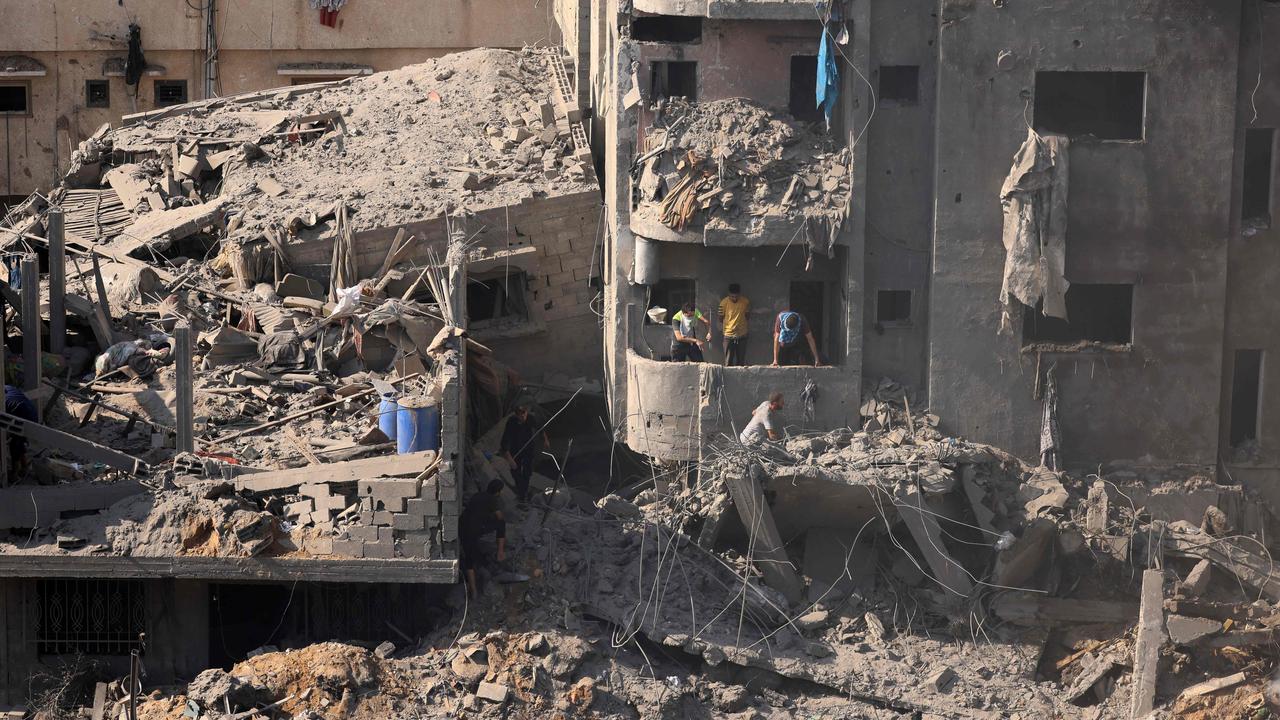
Palestinians check through rubble after the Bureij refugee camp strike.
Biden thinks Netanyahu’s days ‘numbered’
According to American news site Politico, US President Joe Biden believes Israeli Prime Minister Benjamin Netanyahu’s time in office will end soon, and has discussed the matter with his staff – including in the period since he visited Israel and met with the PM.
The President has reportedly told Mr Netanyahu directly that she should start to think about the lessons he will share with whoever succeeds him.
Mr Netanyahu is his country’s longest serving prime minister and has survived multiple scandals in the past, including corruption allegations. But the Israeli public has largely turned on him since Hamas’s attack on October 7.
“There’s going to have to be a reckoning within Israeli society about what happened,” a current US official told Politico, having been granted anonymity to discuss their private conversations.
“Ultimately, the buck stops on the Prime Minister’s desk.”
Polling has shown up to 80 per cent of Israelis hold Mr Netanyahu responsible for the security failures that enabled Hamas’s attack.
He has also been accused of trying to dodge responsibility by pinning the blame for Hamas’s assault on Israel’s national security apparatuses.
During his visit to Israel last month, Mr Biden publicly expressed support for the nation’s right to defend itself. However, in private, he reportedly urged Mr Netanyahu to act with caution, and to prioritise a peaceful two-state solution in the long term.
We should note that, after Politico’s story was published, a spokesman for the Biden administration’s National Security Council denied that Mr Netanyahu’s future had been discussed. The publication’s sources stand by their information.
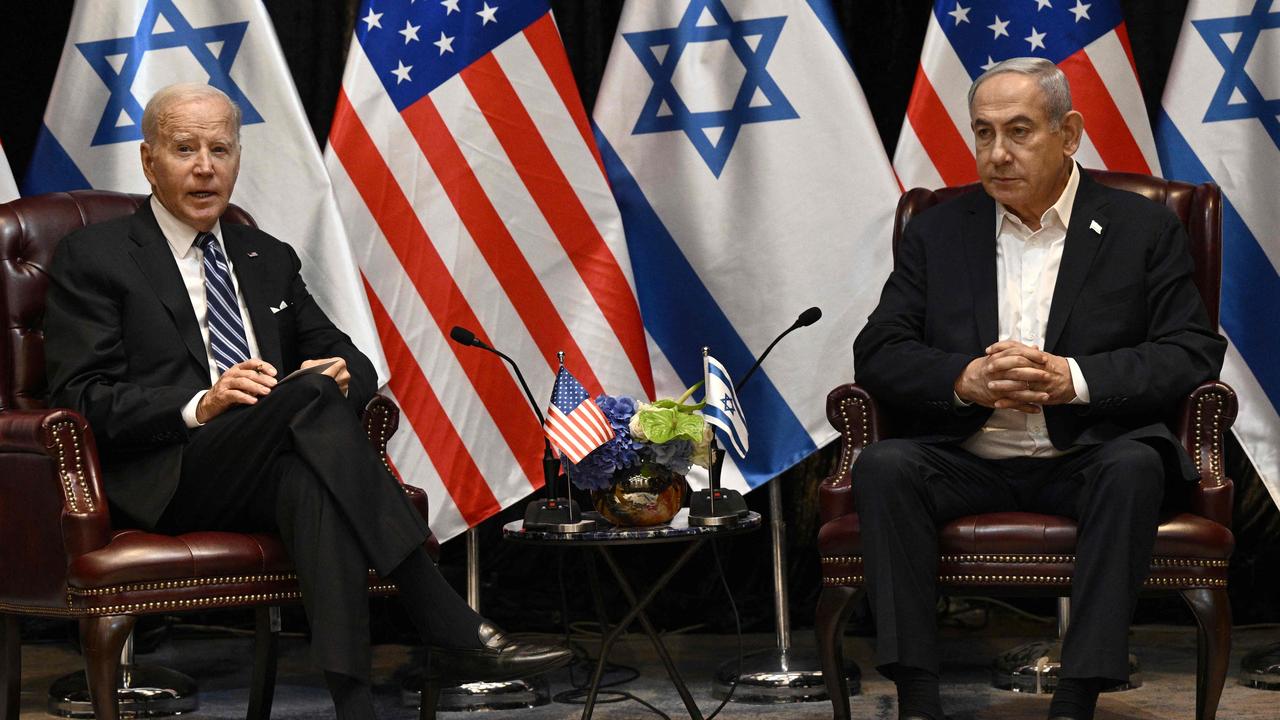
Joe Biden during his meeting with Benjamin Netanyahu in Israel.
‘Pay attention’ to Hamas’ words
The United States has responded to the disturbing remarks from Hamas official Ghazi Hamad, in which he reaffirmed the terrorist group’s commitment to “annihilating” Israel and promised more attacks like the one on October 7.
“That is what’s at stake for the Israeli people. That is what’s at stake for the people of Gaza,” National Security Council official John Kirby said of Hamad’s interview.
“Hamas is willing to continue this fight, and will continue to try to slaughter innocent Israelis.
“Those are chilling comments. We ought to pay attention to them.”
Speaking to LBC International, Hamad said Hamas “must teach Israel a lesson, and we will do this again and again”.
“The Al-Aqsa Flood (Hamas’s name for the attack on October 7) is just the first time. And there will be a second, a third, a fourth. Because we have the determination, the resolve, the capabilities to fight.
“Will we have to pay a price? Yes, and we are ready to pay it.
“The existence of Israel is what causes all that pain, blood and tears. It is Israel, not us. We are the victims of the occupation. Period. Therefore, nobody should blame us for the things we do … everything we do is justified.”
‘Appalling’ conditions in UN shelters
The UNRWA, which is the United Nations agency responsible for helping Palestinian refugees, has again warned that the humanitarian situation in Gaza is “desperate”.
“Some 690,000 internally displaced people are sheltering in 149 UNRWA installations,” the organisation said.
“Our shelters are at almost four times their intended capacity, and overcrowded conditions continue to create severe health and protection concerns.”
The agency says 70 of its workers have been killed so far, which is “the highest number of UN aid workers killed in a conflict in such a short time”.
Its Commissioner-General, Philippe Lazzarini, finally managed to enter Gaza himself yesterday, where he visited one of the UN shelters.
“He was in one of our shelters. There were thousands of people. This is a UN shelter that was indirectly hit during the war,” Juliette Touma, the UNRWA’s director of communications, told CNN afterwards.
“The sanitary conditions are appalling, according to him. People live on the very, very basic — little bread and whatever is left of some water.
“Our staff are dedicated, they keep going, but they are also finding it extremely challenging to operate, giving out the little humanitarian supplies that have been coming into Gaza.”




